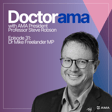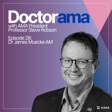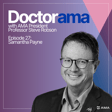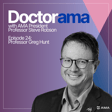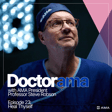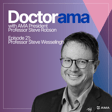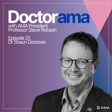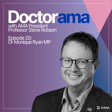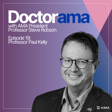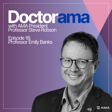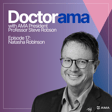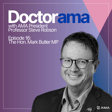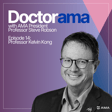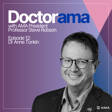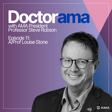Become a Creator today!Start creating today - Share your story with the world!
Start for free
00:00:00
00:00:01

Episode 15 - Dr David Hughes AM
In episode 15 of Doctorama AMA President Professor Steve Robson chats with Dr David Hughes AM.
Recommended
Transcript
Australia's Passion for Sports
00:00:00
Speaker
Well, Australia is a nation obsessed with sport and we've got the Olympics coming up this year, so elite sport will be on everybody's mind. But have you ever wondered about the medical teams who look after the athletes? Are we going to hear about it on Dr Rama this week?
Introducing Dr. David Hughes
00:00:19
Speaker
You're listening to Dr Rama with Steve Robson, bringing you the best of health, medicine and people. My guest this week on Dr Rama is Dr David Hughes, who's the Chief Medical Officer from the Australian Institute of Sport. David, welcome to Dr Rama. Thanks, Steve. Thanks for having me. It's a great pleasure to be here. Well, look, there's a lot happening this year.
Dr. Hughes' Journey into Sports Medicine
00:00:42
Speaker
But I wanted to first of all, you are the Chief Medical Officer for the Australian Institute of Sport.
00:00:49
Speaker
What was it that attracted you to sports and exercise medicine in the first place? How did you land as a sports and exercise physician? It's a really good question and I sort of look back on it and think it's amazing how I ended up here because I had decided to go west over to Perth to do my internship and residency years after going through Newcastle Uni.
00:01:10
Speaker
And I was actually quite interested in pediatrics, and I had just been given the nod that I was gonna get a position on the training program, and I was literally sitting outside someone's door, the career doctor's door, and heard him mention something about a diploma in sports medicine in London, and went in and asked him about it. So I literally overheard a conversation I shouldn't have been listening to. And I don't know what it was. I mean, I'd always liked sport. I'm not a good sport. I was never very good at it, but I just loved it.
00:01:39
Speaker
And I think I did have this thing in my head that maybe I could somehow mix up my enjoyment of sport with my career. And so anyway, I went over to London, did a postgraduate diploma over there. The paediatricians, of course, thought I was mad, thought I was throwing away my career. You'll amount to nothing. Sports medicine is not a thing. And I went over to London and
00:02:03
Speaker
My timing was really great. Timing's everything in life, right? So I did a year-long diploma over there which gave me a really good taste. It's the first time in my life I actually really enjoyed studying.
00:02:13
Speaker
and met a whole lot of people over there. There was about 16 in a year from all over the world and they're all good friends still and all in senior positions around the world. And that's been a great network for me. And then I came back here and just as I arrived back, the Australian Australian College of Sport and Exercise Physicians was just setting up their first training program. They didn't have recognition as a specialty, but they were just setting themselves up with a specialty structure. And I was one of the first intakes of registrars.
00:02:42
Speaker
And I actually came here to the AIS as a junior doctor and did a couple of years here and then did a couple of years outside of here with a private sport and exercise medicine physician by the name of John Kellert, who some of your listeners might remember. Very familiar name. Yeah, a very academic sports physician who was a great teacher and he taught me well.
00:03:05
Speaker
And then I set up my own practice down in Deakin, worked in private practice for about 18 years and grew that practice till we had about five or six doctors.
00:03:16
Speaker
This job came up at the AIS, and I'd always been my own boss, so I wasn't sure that I'd be a good public servant, but actually, and I almost didn't apply for the job, but a few people convinced me that I should apply, and I have to say it's been great.
Role and Impact at the Australian Institute of Sport
00:03:32
Speaker
I love what I do, and it's a completely different environment from private practice, and I wasn't sure that I'd enjoy it, but I really do, and I really,
00:03:43
Speaker
I enjoy who I work with my ability to network in my ability to suppose influence policy and you know influence the system rather than just influencing one patient at a time and I am sure you have a bit of sense of that yourself in your own role and it's it's it's actually quite fulfilling and I really enjoy the fact that
00:04:06
Speaker
I can use my position hopefully to make things better in sport from a safety and integrity and ethical perspective. And yeah, that's what I enjoy doing. So David, when you went to London, where were you based? Where was the training done? Because this was the really early days. Yes, it was really early days and it was run out of the Royal London Hospital in Whitechapel.
00:04:28
Speaker
And it was a postgraduate diploma. There was a surgeon by the name of John King, who was an orthopedic surgeon who had been very instrumental in setting it up. And I, yeah, it was just a small group of 16 people. And it was just, at the time, people said I was mad because I was going back to full-time study for a year. But it, you know, and I wasn't sure at the end of that where it was going to get me, if it was going to get me anywhere. But it was what I needed just to get a taste of this type of
00:04:57
Speaker
medicine, this type of science. And I really enjoy what I do. And I, you know, like, certainly in my position at the moment, I deal with elite athletes and here at the AIS, I don't deal so much with
00:05:09
Speaker
professional coach but more with the Olympic and Paralympic athletes and the pathways leading into Olympic and Paralympic sports. But I have to say in my 18 years in private practice I really did miss that when I first got here and I really enjoyed it and I think people might have the impression that when you're a sport and exercise medicine physician you just see all these rock stars but what I would say is when I was in private practice in Deakin
00:05:37
Speaker
the cross section of my practice was probably not much different to a
The Benefits and Value of Exercise
00:05:41
Speaker
general practice. I saw everybody from kids under the age of 10 who had some sort of musculoskeletal issue to people who were in their 80s or 90s who had musculoskeletal issues. And then we saw a lot of people for whom exercise was their, maybe it was their method of dealing with mental health issues or dealing with other physical challenges that they had from a medical perspective.
00:06:05
Speaker
And I'm a big believer in exercise is medicine. I think if all the benefits of medicine could be put into a pill, we'd be giving it to everybody and giving them lots of it because it does such wonderful things for psychological, physical and emotional health. And I really enjoyed, in my private practice, seeing
00:06:26
Speaker
the benefits of people gained from exercise, even at a reasonably low or moderate level. I think that's a really important point. When I was president of the College of OMG, my time on the council presence of medical colleges, a wonderful guy called Adam Kastricham was the president of the College of Sports and Emergency, Sports and Exercise. Yes, that's right. And when I first met him, he just seemed to be getting these tickets to this fabulous sport.
00:06:56
Speaker
All the time and I was very, very jealous because nobody else seemed to be, you know, off to the, you know, these fabulous sporting events. But I think I really got a sense talking to Adam at the time of exactly what you just said there that we undervalue
00:07:14
Speaker
exercise and movement and all of the things that sports and exercise medicine is about compared to technology. But in fact, what you can achieve and the change you can make in people's health and their lives through what the work that you and your colleagues do is quite extraordinary, isn't it? Yeah, I think so. Look, I feel really, yeah, I feel really lucky to have had that experience in private practice. And I know Adam very well and I know, I know the way he practices and I know he's sort of,
00:07:44
Speaker
ethos about promoting exercise. I just think it's that old adage of, are we going to structure the health system so that we stop people going off the cliff or are we just going to park the ambulance at the bottom of the cliff and try and fix people up once they've gone off it?
00:08:03
Speaker
It actually is really pleasing. I was walking around the lake with my wife this morning and just seeing all the young people who are out there jogging and things like that. And I think the young people might save us, honestly, because you see things like the dropping alcohol consumption rates and things like that in Australia, all being driven by the young people who are just drinking less than what our generation did. And I think there is more of an exercise focus and it's becoming cool again to be fit. And I'm hoping that that's
00:08:33
Speaker
AUG as well. But certainly I do everything I can to make sure that government's always reminded about the benefits for mental health and physical health of regular exercise.
Understanding the Australian Institute of Sport's Success
00:08:47
Speaker
And I think if everyone was able to achieve or get close to the recommended daily dose of exercise, then
00:08:58
Speaker
we would save billions in health. I agree with you, absolutely 100% David. Now look, a lot of people listening won't understand what the Australian Institute of Sport is, what its relationship is to sport in the country, how it fits in with the Sports Commission. Can you just talk us through a little bit about the role of the AIS? Now I wanted to get to
00:09:22
Speaker
than what you and your medical team do at the AIS? I think that the basic premise of the AIS is the high performance arm of the Australian Sports Commission. So the Australian Sports Commission is the overarching body that's in charge of everything to do with sport in Australia, including participation rates and very focused on trying to increase participation rates in sport and exercise, whether that's in an organised sport fashion or in
00:09:51
Speaker
solo exercise. The AIS is the high performance arm of the Australian Sports Commission.
00:09:57
Speaker
And so the AIS is unashamedly charged with trying to improve our international performance in elite sport. But our catch cry is win well. So we never say here win at all costs. We do not say that because we've seen bad things happen in sport. We want Australians not just be proud of people winning, but
00:10:24
Speaker
being proud of how they conduct themselves in sport. And that's a big part of our ethos here, because we think we want Australians to be proud of their athletes when they're representing them overseas. And that's clearly not always the case, but we hope it's the case in the far majority of situations. So here at the AIS, we have some living athletes. So we have basketball athletes who have a large female and male basketball cohort.
00:10:51
Speaker
You might not know that at the AIS we have an NBA, as in the National Basketball Association in the US, we have an NBA Global Academy here because the AIS has been, I think, more successful than just about any other center in the world in turning teenage basketballers into college basketballers in the US at US colleges and eventually into NBA basketballers. The CEO of the NBA said a few years ago, I think if I had a son who was
00:11:20
Speaker
showing promise, I would send him down there to that place in Australia, because I don't know what they're doing, but whatever they're doing, it works. And so the NBA picks up kids who are about 15, 16, 17 from around the world who they think show some promise, send them here. And that's another squad that's here as well that we take care of. And we sort of try and give them that high end sort of polishing of their skills and that to take them from being
00:11:50
Speaker
kids with promise to athletes who really know what high performance is and how to conduct themselves and how to train and take care of themselves and prepare them for a life as a professional basketball. Well that's extraordinary. I had no idea that that was the situation.
Managing Health Crises in Sports
00:12:06
Speaker
Look, I gather that when you gave up your private practice and moved to the AIS, you faced some extraordinary challenges like everything from the Zika around the Rio Olympics that you had during the prep for the Tokyo Olympics. You had all of the issues with bushfires and then of course COVID
00:12:30
Speaker
pandemic and trying to manage athletes in the early stages of the pandemic. You had all sorts of crises like that. I mean, how did you find with so much public expectation on our athletes, managing them in the public gaze like that, David?
00:12:48
Speaker
Yeah, look, I think it's been a really interesting experience and I think what I've appreciated is the fact that the brand of the AIS is very useful in being able to connect with other people. So with both the Zika crisis leading into the Rio Olympics and with the COVID crisis obviously leading to the Tokyo Olympics,
00:13:10
Speaker
It was amazing how we got plugged into a whole lot of intergovernmental agencies like Department of Foreign Affairs and Trade, even Defence, Border Control, all sorts of infrastructure, all sorts of organisations who are prepared to sit around a table.
00:13:28
Speaker
with the AOC, Australian Olympic Committee, obviously the Organising Committee, that sort of gets people ready for the actual games. And just to be able to plug into all of that, have these discussions and make these multi-agency plans, that was a really great privilege and a really, an eye-opener for me that, wow, this is what government does. They have all these things in the background that no one sees, all this capability that hums along. And when there's a problem, and like if you think about COVID,
00:13:56
Speaker
At that stage, there were no flights in or out of Japan, right? So there were special Olympic flights just for the purpose of games to go in to deposit people. But there was always the prospect that things, what if things went bad? And I had staff pull out in the year or so leading into the games because they felt like, well, this is crazy going from a safe situation to Australia into an
00:14:21
Speaker
situation of unknown where if you got COVID, you could be put in a hospital where you don't speak the language, your family can't talk to you, no one can talk to you, all that sort of thing. So it was quite stressful for some members of staff and we respected everyone's wishes with what they wanted to do. But clearly the government had to have a plan for what if it all went bad in Tokyo, how are we going to get the thought of having
00:14:44
Speaker
over a thousand Australians sort of stranded in Tokyo with a massive outbreak or something like that. That was something they had to be planned for. But it's amazing. That's what the government does. And I think in some ways, I think that the whole, you know, the Australian public and I certainly didn't have an appreciation of how much the government does in the background. And you don't realise that actually
00:15:05
Speaker
We're really lucky to live in this country where you've got a government that's constantly scanning the horizon for risk and for all sorts of different things. And there are things going into place that no one is aware they're going into place as a risk mitigation in case, you know, worst case scenarios in all sorts of different things. So it's certainly given me a much better appreciation of what a great job government does and the power of interagency collaboration across government when there's a big project or issue that's on the table that's complex.
00:15:33
Speaker
and they can bring all this expertise to the table is quite impressive absolutely now i'm gonna ask you before i get to the concussion new guidance in a second i wanna ask you what you would say the differences between.
Athlete Health vs General Practice
00:15:48
Speaker
Managing the health of a high performance elite athlete as compared to sort of the usual medical practice cuz it must be very different.
00:15:57
Speaker
There are differences but if i could add the first i'd like to say is what is the same because you imagine it would be so different but at the end of the day you know what they want. I want someone who listens to their story.
00:16:09
Speaker
takes it seriously and actually thinks about it and thinks about it and empathises with their particular position. I know normally you wouldn't let someone push on with this, but this is the only Olympics. I've missed out on the last two Olympics. I finally got there, but given my age, this is the only one I'm going to be going to.
00:16:30
Speaker
Yes, I understand it's high risk to push on with whatever the condition is, but you need to appreciate I've put 12 years into this and this is my one shot. So something like that might be, but really at the end of the day, they're just human beings. And I think what they want to be is treated like a human being. And what I say to young doctors who sometimes come in here and meet with me because they're thinking of a career in sports medicine, they just want to have a chat. I say to them,
00:16:59
Speaker
Don't do sports medicine if you're a fan. Because if you're going to be a fan, you're dangerous. If you want to be a fan, you get a ticket, you go and sit up in the stadium. That's where you belong. But if you want to do sports medicine, you have to remember that the number one thing is your duty of care to the patient who is the athlete.
00:17:23
Speaker
And it doesn't matter what the coach says. And most of the coaches I've met are fantastic people and they just need a reasonable conversation and they do the right thing. But if you disagree, if you think that people are making decisions which are not going to be safe, you have to be prepared to say so. You have to be prepared to be unpopular. And at the end of the day, you've just got to keep in front of mind what is actually best for the health of this person.
00:17:51
Speaker
all these things in sport. They're fantastic and I've seen some wonderful things. I've been very fortunate to be on the sideline to see some absolutely amazing sporting moments.
00:18:03
Speaker
At the end of the day, if you make a decision that actually you think you're helping the person at the time, but it affects them for the rest of their life because of some particular injury that you could have potentially prevented, they're not going to thank you in the long run. And sometimes you just have to be the grown up in the room. That's the role of the doctor often, to be the grown up in the room and say,
00:18:24
Speaker
you know, this is not a good idea to go ahead and this is why and so I'm not going to clear this person to play. And look, what my experience of coaches is, while they always love, of course they want their star performers out there doing what they need to do, but as long as it's clearly explained and you can back it up with the evidence and that good experienced coaches know that
00:18:49
Speaker
It's not the right thing to roll people out when there's some sort of significant threat to what they're intending to do. But sometimes I do say you do push on with people where you say, look, this is the risk. It's not going to be, it's not a life threatening risk, but you just got to understand that this thing could go pop or it might not stand up to this. But as long as you're willing to accept
00:19:09
Speaker
where I think there's a reasonable chance you'll get through this. But like everything in medicine, not many things are black and white. And I think it seems so high stakes because a lot of it is in the public gaze and you have the high expectation.
Concussion Guidelines and Athlete Safety
00:19:23
Speaker
Look, I want to move away from Elite to the concussion guidelines that were released last week and the genesis of those. Are you happy to talk me through those and the evidence behind them?
00:19:39
Speaker
Yeah, sure. So look, we've produced position statements since 2016 and it really came about because I think back about 2014, I think Peter Dutton was the health minister and his ministerial adviser rang me and said, look, there was a lot of controversy in the papers about concussion and what they wanted. There was a lot of criticism of the major sports, which I
00:20:03
Speaker
I didn't agree with, but essentially what the Minister wanted was an independent position statement that was written independent of sport. So we wrote a position statement in 2016. We've upgraded it every year, and this one is probably our most comprehensive
00:20:20
Speaker
the 2024 and it's named concussion and brain health because acknowledging the concern that is out there in the community and it's a real concern, it's a palpable concern. We know that there are some schools, some secondary schools in Australia who have closed down successful team sport competitions, programs that they've had in their school because
00:20:46
Speaker
they have been convinced that that will damage the long-term brain health of the children. Now, I don't agree with that premise for a number of reasons, but that doesn't matter. It's an indication of the amount of anxiety that's out there. And I have to say that I have a real, I'm very cognizant of the fact that this role as Chief Medical Officer of the AIS
00:21:12
Speaker
carries a fair bit of responsibility just because of the brand of the AIS. And the one thing that I'm very proud about, about being and working for this organization is that universally, everywhere you go, if I go overseas and, you know, I say I'm the chief medical officer of the AIS, that opens doors. I mean, the AIS is renowned around the world as a great center of excellence. And one of the first that really modeled this, you know, center of excellence where you bring a lot of expertise onto one campus and then have people come through the campus. But
00:21:43
Speaker
I'm very cognizant of the fact that the AIS is obligated almost by dent of its good reputation and a sense that it's government, it's neutral, that what we say makes a difference and therefore where there's concern of a
00:22:02
Speaker
of a safety nature or an integrity nature in Australian sport. I think it's really important that the AIS and the Australian Sports Commission have a voice. Whenever you try and lead with something, you have to expect that you will attract criticism at times.
00:22:19
Speaker
absolutely how democracy should work. But I think I've got used to that. It's funny, I didn't think I would, but I've got used to that sort of thing. But I feel very keenly that responsibility in my role that we can't sit back and expect someone else to do something. If we don't
00:22:34
Speaker
don't do it, who's going to do it? You know what I mean? And so we've had a range of different issues. Late last year, we launched a SunSafe position statement in sport with Georgina Long and Richard Scolier, which was fantastic. They co-authored it, which was a great experience, just because we're aware that athletes are out in the sun much more. You all know the sun messages, but actually we are seeing young athletes
00:22:59
Speaker
develop skin cancers, including melanomas. And, you know, we need to, we just need to make sport organisations aware of this, that we have a responsibility to provide a safe, you know, training space and a safe competition space for athletes. So there's a whole range of different issues out there that we address. But I think, just want to make that point that I think if the AIS isn't going to stand up and say something about these issues, what other organisation is? Absolutely.
00:23:27
Speaker
Look, David, I know how incredibly busy you are. I'm extremely grateful that you've taken the time to talk to me. I'm in awe of what you do. I'm in awe of the mission and all of your medical team at the AIS. And I want to thank you for what you do. And it's been an absolute pleasure speaking with you this afternoon. Thank you, Steve. It's been a great pleasure to talk to you too. You've made me think about some things I haven't had to think about deeply before. So it's been a really enjoyable chat. Thank you.
00:23:56
Speaker
Fantastic. Well, thank you very much for joining me on Dr Rama.
